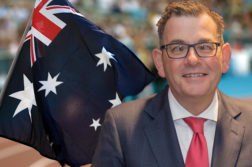They say a frog, placed in a saucepan of cold water, can be slowly boiled to death, as long as the water temperature is raised slowly enough.
The boiled frog metaphor, like its age-old cousin, the slippery slope, has long been used to describe processes of gradual but dangerous change. The idea is that the slow ratchet of distasteful change can eventually lead a person or a nation to a state of affairs unimaginable at the starting point.
It’s now clear we’ve reached that point in asylum seeker policy. Australia was once a proud liberal democracy that peacefully settled hundreds of thousands of refugees from all over the world. Now we risk becoming a rogue state in the Asia-Pacific, tearing up international conventions, defying the United Nations, home to a government breaking its own laws.
This is what we can conclude from the events of the past few days:
The Australian government is actively colluding in the imprisonment and likely torture of dissidents fleeing one of the most brutal regimes in Asia – a government currently being investigated by the UN for war crimes. We are handing the persecuted back to the persecutors.
A minister of the Australian government is openly and blatantly lying to the Australian people about a matter of life and death at sea.
The Australian government, a founding signatory of the Refugee Convention, is openly flouting that Convention. It appears to have broken Australian law in the process.
The military is now completely in charge of Australian immigration operations. A general is in command of civilian agencies. A sinister faceless logo for “Border Force” sums up an increasingly fetishised politics.
Meanwhile, thousands of innocent men, women and children moulder in tropical prisons, many of them slowly going mad. There have been more than a dozen deaths in immigration prisons since 2010. There have been several violent riots, a number of suicides, and one man in Australian care, Reza Berati, has been murdered. No-one has been charged with his assault, and we still don’t know the full details of what occurred.
As with any slippery slope, it’s hard to know how to stop the sliding. But now we find ourselves well down the descent, hurtling towards a meaner and less democratic country.
Both major parties, and a majority of voters, have been complicit. That modern hero of progressive politics, Paul Keating, first introduced mandatory detention for asylum seekers all the way back in 1992. According to Labor’s immigration minister at the time, Gerry Hand, mandatory detention was “only intended to be an interim measure.” Twenty-two years later, thousands are in jail.
The Tampa incident of 2001 was the next milestone on the road to perdition. John Howard’s armed take-over of a Norwegian merchant vessel that had stopped to respond to an SOS call was a key moment in the development of Australia’s asylum seeker psychosis. For the first time, a military response was applied to a civilian problem. Not for the first time, the ALP acquiesced.
It was also John Howard’s government that first decided to send innocent people to distant islands, using the catch-all justification of deterrence. The Pacific Solution, as it came to be known, can hardly be called a solution, given that boats are still coming and asylum is still being sought. But a slowing in the boat arrivals allowed the Coalition to claim victory; a compliant and sometimes xenophobic media swallowed the assertion.
For a time, in the early years of Kevin Rudd’s government, it looked as though a more humane approach would be tried. On coming to office, Rudd proclaimed he would honour both the “spirit and letter” of the Refugee Convention. The prison on Nauru was decommissioned and temporary protection visas were scrapped. Rudd’s first immigration minister, Chris Evans, proclaimed “seven key values” of Labor’s immigration policy. Children were not to be detained, and detention would not be “indefinite” or “arbitrary”. In a grim irony, the seventh value advanced the unlikely goal that “conditions of detention will ensure the inherent dignity of the human person.” Tell that to the relatives of Reza Berati.
Meanwhile, the boats kept coming, just as they’ve done, in varying numbers, for the past two decades.
Labor’s compassion didn’t last. The Coalition in opposition always viewed border protection as a prime opportunity for attack. With the assistance of talk radio shock jocks and the demagogues in the Murdoch tabloids, the Coalition was able to manufacture a first class scare campaign on the number of boats reaching Australian waters. Tony Abbott even called it a “peaceful invasion.” This was the language of Pauline Hanson, barely disguised as a concern for the safety of those at sea.
By early 2010, adrift in the polls and thoroughly spooked by the right-wing media, Rudd abandoned the “seven principles” and Evans was shuffled out of the portfolio. By the time Rudd was deposed by Gillard, Labor’s supposedly weak border protection policies had been firmly entrenched as a political truth, one of those received wisdoms that few in the political classes chose to contest.
From then on, it was a race to the bottom. In the process, all sorts of legal conventions and democratic safeguards have been trashed in the name of “securing our borders.” In 2011, Labor’s Chris Bowen came up with a complicated people swap deal with Malaysia, which he tried to claim was a good thing for asylum seekers, because 4,000 supposedly “genuine” refugees would be resettled. But the sting in the tail was that no-one who travelled to Australia by boat would ever be settled here. When the High Court struck down the Malaysian deal, Labor turned to Timor-Leste, and then PNG. Labor slid rapidly down the slippery slope, no longer encumbered by its conscience.
By the time Scott Morrison assumed office in 2013, the ALP had surrendered any trace of moral high ground on the issue. With a thumping majority and little ability of the Senate to oversee the events in far off waters, Morrison was gifted an essentially free hand.
With all the nastiest options already embraced under Julia Gillard, and her parade of failed immigration ministers, Morrison turned instead to the symbolism, ramping up the military trappings. The military was placed in charge of immigration policy, with a general in command. A ridiculous name was confected: Operation Sovereign Borders. And all semblance of media scrutiny was abandoned.
To add insult to injury, the Abbott government has steadfastly refused to comment on these matters – even to Parliament, and let alone to the media. Exceptions have been made only for media opportunities that suit it, for instance Scott Morrison’s softball interview with shock jock Ray Hadley on Monday.
Now, just 10 months into its first term, the Abbott government appears to be throwing away the rule of law as well. The decision to intercept a boatload of Tamils – reportedly crewed by former officers of the Tamil Tigers Navy – and return them to the Rajapaska regime is the most blatant abrogation of Australia’s international responsibilities yet. It is almost certainly what is known in legal parlance as refoulement – and therefore, under the federal Migration Act, illegal.
Australian law requires asylum seekers to be properly interviewed and processed. In the case of the two most recent boatloads, they were not. Instead, they appear to have been quickly given mobile phones and asked only four misleading questions by Immigration officials speaking from Australia. All this happened under the purview of the Australian and Sri Lankan navies. Needless to say, no lawyers were present.
There have already been reports that the 41 asylum seekers handed over to the Sri Lankan government have been arrested. “They will be brought before the Galle magistrate on Tuesday,” Sri Lankan police spokesman Ajith Rohana told Agence France-Presse.
To say this is an alarming development for Australian democracy is an understatement. This is a fundamental erosion of Australian human rights, and the rule of law itself.
Sydney University historian John Keane has a perceptive article in The Conversation. “When a bounded nation-state democracy prosecutes war abroad,” he writes, “the spirit and institutions of its democracy are usually vandalised at home”. The Abbott government has militarised immigration policy, fighting a war against unarmed refugees seeking safety at our borders.
The result has been brutality to those seeking our help, and the steady erosion of the liberties of citizens at home. Poor fella, my country: Australia in 2014.
It turns out the slow-boiled frog is an urban myth. Any self-respecting frog will jump out when the water gets too hot. If only the innocents trapped in the coils of Australia’s Pacific gulags could do the same.
Donate To New Matilda
New Matilda is a small, independent media outlet. We survive through reader contributions, and never losing a lawsuit. If you got something from this article, giving something back helps us to continue speaking truth to power. Every little bit counts.



